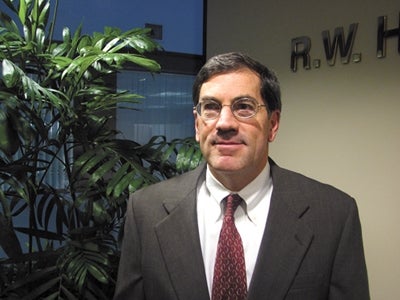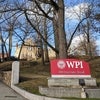Anything's Up From Here
 Photo/Courtesy
John Eysenbach, a broker with R.W. Holmes Realty Co. Inc. in Wayland, said uncertainty has decreased for the commercial real estate market. But that's not going to mean a complete turnaround in 2010.
Photo/Courtesy
John Eysenbach, a broker with R.W. Holmes Realty Co. Inc. in Wayland, said uncertainty has decreased for the commercial real estate market. But that's not going to mean a complete turnaround in 2010.
2009 was a long year for folks in commercial real estate. The way things are shaping up, it looks like 2010 could be another long year for those same weary deal makers, property owners and tenants.
Overall, brokers working in suburban Boston expect improvement over 2009, but not all-out recovery. They were encouraged by a couple of decent quarters to round out the year. What they saw was an uptick in motivation to make deals happen and the overall amount of activity in the market.
John Eysenbach, a broker with R.W. Holmes Realty Co. Inc. in Wayland, said that while the slight improvements the market has seen in recent months is encouraging, 2010 is more likely to be “more of the same.”
Sense Of Urgency
“We’ve been able to spark interest from tenants, and landlords are more willing to come to the table. There’s less sense of uncertainty,” Eysenbach said. Whether that can grow into real stability and optimism remains to be seen.
“In New England, we’re not as grossly affected by any one sector, but employment is still a big factor. We need to see some improvement on that front. Job generation has a lot to do with the success of the economy,” Eysenbach said.
As the recession deepened, the commercial market was ruled by uncertainty, especially the industrial properties and owners Eysenbach represents. Tenants had laid off personnel, but were unsure about what to do with excess space: Sublease it? Vacate it? Sell it and lease it back?
For many, the answer was to do nothing, whether they wanted to or not. Sublease space simply sat on the market and other transactions were equally hard to come by.
But Eysenbach said he’s seen a few things late in the year that encourage him.
“I think we are, in fact, bottoming out. The number of transactions has increased, and things are beginning to stabilize, which gives people a high vote of confidence. We had a transaction with a deadline of less than 30 days, so there’s a sense of urgency from people who sat on the sidelines all year,” he said.
Whether lenders share the same sense of urgency is unpredictable, according to Jim Umphrey, partner at Kelleher & Sadowsky Associates, a Worcester-based commercial real estate firm.
Throughout 2009, lenders were reluctant to get involved in commercial real estate deals, but “the economy is in a slightly better place than it was at the beginning of the year, and the financial system is in a much better place than it was at the beginning of the year,” Umphrey said.
Still, Umprey said there’s “a sense of trepidation” on the part of lenders that is typical of recessionary periods.
“People want to keep their powder dry,” he said.
Up And Down
In the Worcester area, how the New Year will treat the commercial market varies by sector. The office market in and around the city has been stable for years, and wasn’t hammered by the recession like some other areas. According to a report from the Worcester Research Bureau, the occupancy rate in the central business district of Worcester was 82 percent as of August 2009. That’s the lowest rate since the bureau began tracking commercial real estate occupancy in 2002.
Insulated from the downturn in the downtown was so-called Class A space, which saw a slight increase in occupancy from 88.9 percent to 90.3 percent. Class A space is the higher end space within the market that’s either new or heavily renovated. However, a curve ball in the city’s office market may come if and when the CitySquare project gets off the ground. Unum Group has said it will move its local headquarters and 700 employees from 18 Chesnut St. to the CitySquare development. If it signs a lease with the project’s developer, Berkeley Investments, that would leave a major hole on Chestnut Street and there are no obvious big businesses to absorb that space.
In the region, warehouse space isn’t sporting incredibly high vacancy rates, but on the other hand, it isn’t attracting a whole lot of interest these days.
And manufacturing space, “is one where there’s been some pain,” Umphrey said. “There are some companies that are doing very well. The strong are getting stronger, but the weak are getting crushed.”
Umphrey said he expects the retail market, which saw “a complete reeling in” of activity in 2009, to at least show some improvement in 2010.
Finance Outlook
“There’s not going to be a dramatic turnaround in any sector,” Umphrey said.
That’s partly because each part of the commercial real estate market has been affected by the recession.
For example, retail real estate is affected by decreases in consumer spending. The office market is affected when tenants leave, or renew a lease rather than expand.
But commercial mortgage-backed securities, the way commercial real estate deals, especially the purchase of large office properties, are financed has also taken a big hit during the recession.
The CMBS market was worth almost $300 billion in 2007, and today “is gone,” Umphrey said. As a result, big commercial real estate transactions were almost non-existent in Central Massachusetts during the last year.
In the absence of CMBS, other, more traditional loans are available, but the underwriting for those loans has become much more conservative.
Instead of counting on an 80 percent loan-to-value ratio, investors can look forward to 60 percent, and possibly even 50 percent.
They can also count on a 20-year term rather than 25 or 30 years with an interest rate that’s fixed for just 5 years rather than 10.
“That has an effect on property values and returns,” Umphrey said. “Real estate is a leveraged business, and as terms and financing changes, the underlying value (of property) changes up or down."









0 Comments